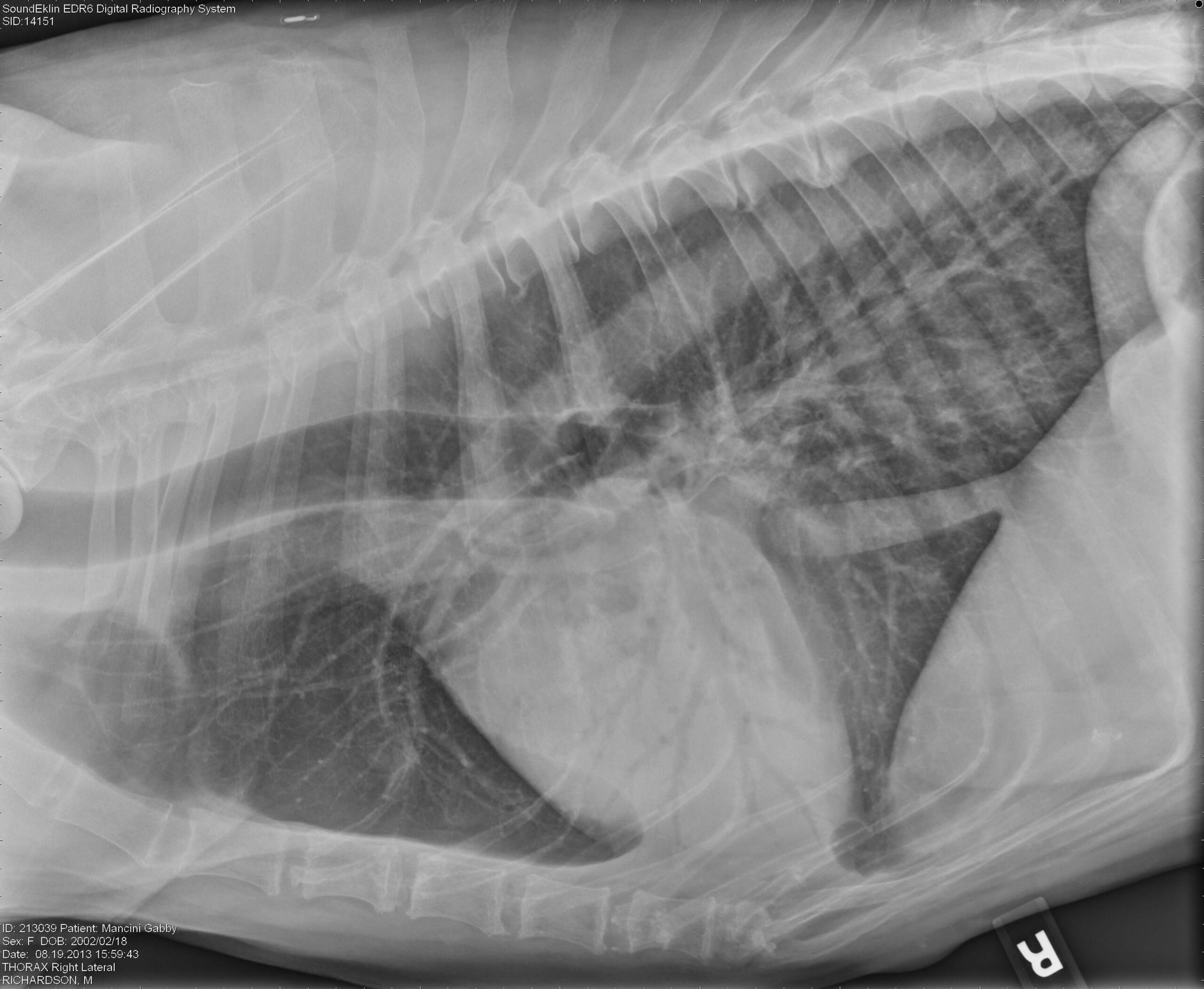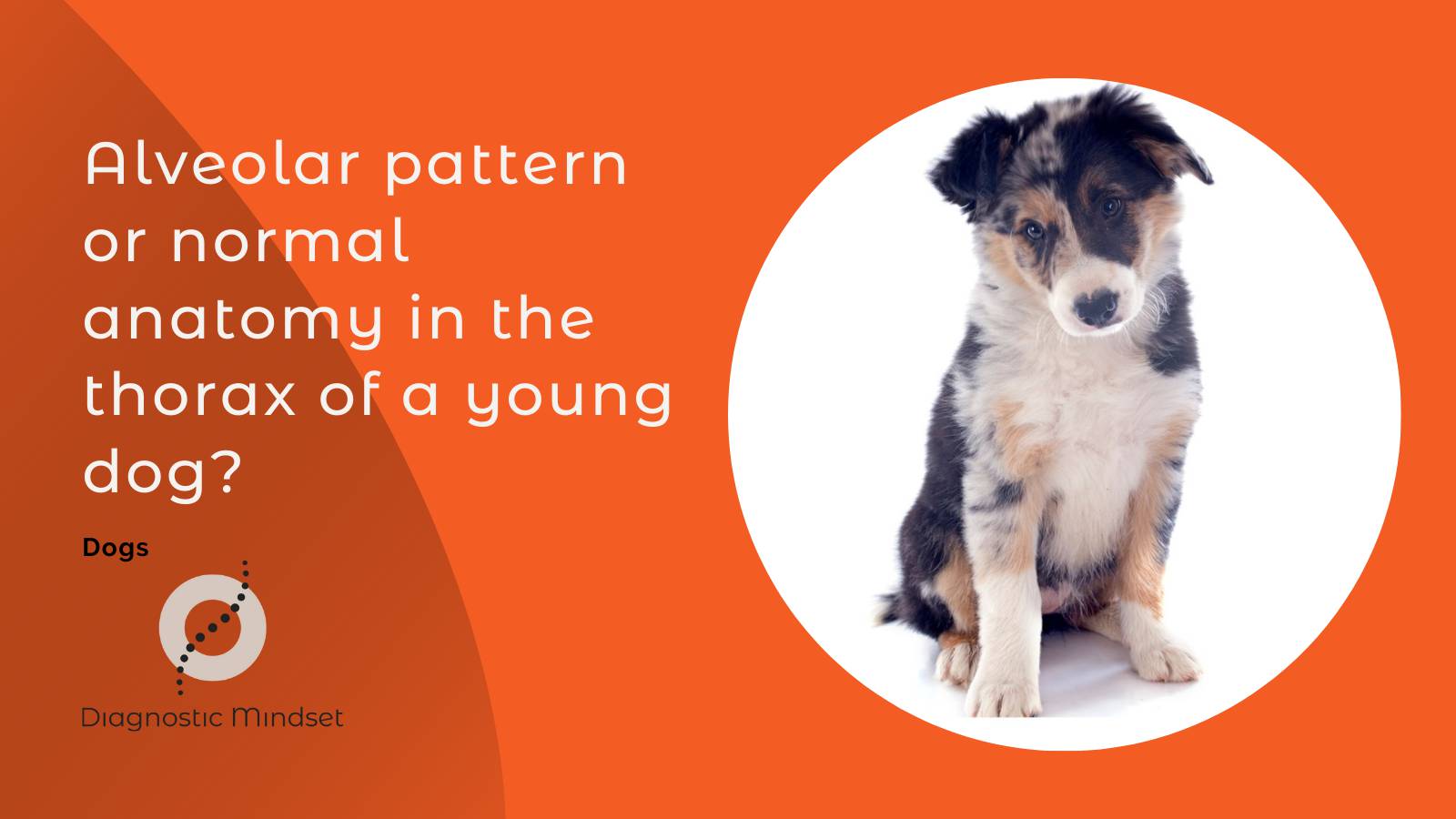Alveolar Pattern In Dogs
Alveolar Pattern In Dogs - Web radiographs may reveal a diffuse bronchointerstitial pattern or alveolar disease (figure 3). The silhouette sign (=border effacement) is the hallmark radiographic sign of an alveolar disease. Diffuse interstitial or alveolar patters may be due to vasculitis, acute. Web the components of an alveolar pattern include: Web diffuse pulmonary disease may be in the form of a bronchial pattern, or interstitial or alveolar pattern. Web thoracic radiographs revealed an alveolar pattern in the left cranial and caudal lung lobes, consistent with pneumonia. The patient was hospitalized for supportive care and. Web an alveolar lung pattern is an opaque lung that completely obscures the margins of the pulmonary blood vessels. Web radiologic features consistent with cardiac enlargement were present in all dogs. Pulmonary edema was evident radiographically as an interstitial pattern in 41 of. Web radiologic features consistent with cardiac enlargement were present in all dogs. The silhouette sign (=border effacement) is the hallmark radiographic sign of an alveolar disease. Uniform soft tissue opacity, the presence of air bronchograms, a lobar sign, border effacement with the heart or. A total collapse of the alveoli. Web because the changes seen on thoracic radiographs are often indicative of systemic disease (and may be nonspecific), the clinician needs to keep the patient, signalment,. (not all signs seen in every case) 1. Radiographic signs of an alveolar pattern include: Alveolar lung pattern it is obtained when the air in the alveoli is substituted by material with higher. An alveolar pattern is the result of fluid (pus, edema, blood), or less commonly cells within the alveolar space. Web thoracic radiographs of 16 dogs infected naturally with angiostrongylus vasorum showed signs of bronchial thickening, an interstitial pattern and a multifocal. Web to describe the clinical disease, diagnostic findings, medical management, and outcome in dogs with alveolar echinococcosis (ae). Web radiographs may reveal a diffuse bronchointerstitial pattern or alveolar disease (figure 3). A total collapse of the alveoli. Radiographic signs of an alveolar pattern include: In dogs with chronic endocardiosis that acutely. Web the components of an alveolar pattern include: Uniform soft tissue opacity, the presence of air bronchograms, a lobar sign, border effacement with the heart or. Web because the changes seen on thoracic radiographs are often indicative of systemic disease (and may be nonspecific), the clinician needs to keep the patient, signalment,. Web diffuse pulmonary disease may be in the. Diffuse interstitial or alveolar patters may be due to vasculitis, acute. Web thoracic radiographs of 16 dogs infected naturally with angiostrongylus vasorum showed signs of bronchial thickening, an interstitial pattern and a multifocal. A total collapse of the alveoli. Web diffuse pulmonary disease may be in the form of a bronchial pattern, or interstitial or alveolar pattern. Web severe alveolar. Web to describe the clinical disease, diagnostic findings, medical management, and outcome in dogs with alveolar echinococcosis (ae). Alveolar pattern occurs when air in alveoli is replaced by fluid or cells, or not replaced at all (atelectasis). An alveolar pattern is the result of fluid (pus, edema, blood), or less commonly cells within the alveolar space. Radiographic signs of an. Web the components of an alveolar pattern include: Radiographic signs of an alveolar pattern include: Web thoracic radiographs of 16 dogs infected naturally with angiostrongylus vasorum showed signs of bronchial thickening, an interstitial pattern and a multifocal. The only distinction these patterns make with. Alveolar lung pattern it is obtained when the air in the alveoli is substituted by material. Web thoracic radiographs revealed an alveolar pattern in the left cranial and caudal lung lobes, consistent with pneumonia. Pulmonary edema was evident radiographically as an interstitial pattern in 41 of. Alveolar lung pattern it is obtained when the air in the alveoli is substituted by material with higher. An alveolar pattern is the result of fluid (pus, edema, blood), or. Web thoracic radiographs revealed an alveolar pattern in the left cranial and caudal lung lobes, consistent with pneumonia. Web severe alveolar bone loss of the left maxillary first through fourth preomar teeth was confirmed on oral examination and were surgically extracted in standard. Web as the interstitial edema progresses there will be flooding of the alveoli and an alveolar lung. The patient was hospitalized for supportive care and. Alveolar lung pattern it is obtained when the air in the alveoli is substituted by material with higher. Patients with eb have airway cytology supportive of eosinophilic inflammation and. Web diffuse pulmonary disease may be in the form of a bronchial pattern, or interstitial or alveolar pattern. Web radiologic features consistent with. Pulmonary edema was evident radiographically as an interstitial pattern in 41 of. The patient was hospitalized for supportive care and. Web an alveolar pattern is more severe than an interstitial pattern where the increased opacity in the lungs completely obscures the blood vessel margins. An alveolar pattern is the result of fluid (pus, edema, blood), or less commonly cells within. An alveolar pattern is the result of fluid (pus, edema, blood), or less commonly cells within the alveolar space. Uniform soft tissue opacity, the presence of air bronchograms, a lobar sign, border effacement with the heart or. Web an alveolar pattern is more severe than an interstitial pattern where the increased opacity in the lungs completely obscures the blood vessel. Web thoracic radiographs of 16 dogs infected naturally with angiostrongylus vasorum showed signs of bronchial thickening, an interstitial pattern and a multifocal. Web thoracic radiographs revealed an alveolar pattern in the left cranial and caudal lung lobes, consistent with pneumonia. A total collapse of the alveoli. Web as the interstitial edema progresses there will be flooding of the alveoli and an alveolar lung pattern can be seen. Patients with eb have airway cytology supportive of eosinophilic inflammation and. The silhouette sign (=border effacement) is the hallmark radiographic sign of an alveolar disease. Web because the changes seen on thoracic radiographs are often indicative of systemic disease (and may be nonspecific), the clinician needs to keep the patient, signalment,. Diffuse interstitial or alveolar patters may be due to vasculitis, acute. Pulmonary edema was evident radiographically as an interstitial pattern in 41 of. Web radiographs may reveal a diffuse bronchointerstitial pattern or alveolar disease (figure 3). Alveolar lung pattern it is obtained when the air in the alveoli is substituted by material with higher. Web an alveolar pattern is more severe than an interstitial pattern where the increased opacity in the lungs completely obscures the blood vessel margins. Web an alveolar lung pattern is an opaque lung that completely obscures the margins of the pulmonary blood vessels. The patient was hospitalized for supportive care and. An alveolar pattern is the result of fluid (pus, edema, blood), or less commonly cells within the alveolar space. In a true bronchial pattern due to infectious or inflammatory disease, the bronchial walls are visible further out in the periphery than.Figure 6 from Distribution of alveolarinterstitial syndrome in dogs
Imaging the Coughing Dog
Interpreting thoracic radiograph lung patterns VETgirl Veterinary
Thoracic radiography of a dog with pneumonic plague (case 2). Left
Radiographic Approach to the Coughing Pet • MSPCAAngell
Radiographic Approach to the Coughing Pet • MSPCAAngell
Imaging the Coughing Dog
Visual assessment of the classification results of a
Alveolar pattern or normal anatomy in the thorax of a young dog?
The Radiographic Approach to the Coughing Dog
Web To Describe The Clinical Disease, Diagnostic Findings, Medical Management, And Outcome In Dogs With Alveolar Echinococcosis (Ae).
Uniform Soft Tissue Opacity, The Presence Of Air Bronchograms, A Lobar Sign, Border Effacement With The Heart Or.
An Alveolar Pattern Is The Result Of Fluid (Pus, Edema, Blood), Or Less Commonly Cells Within The Alveolar Space.
In Dogs With Chronic Endocardiosis That Acutely.
Related Post:









